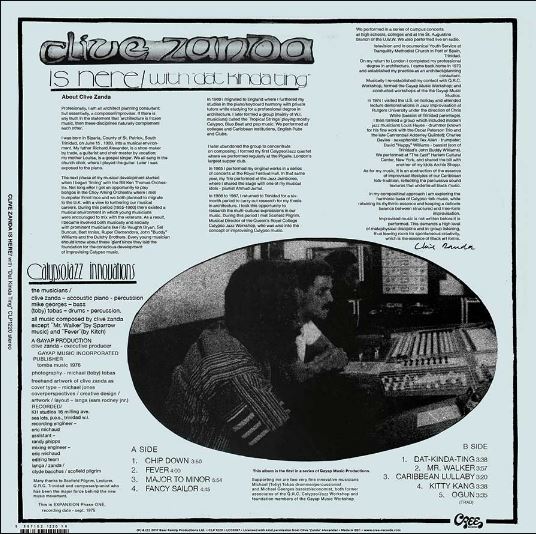Clive Zanda: Clive Zanda Is Here With 'Dat Kinda Ting' -- from back cover notes
 Professionally, I am an architect planning consultant; but essentially, a composer/improviser. If there is any truth in the statement that 'architecture is frozen music, then these disciplines naturally complement each other.'
Professionally, I am an architect planning consultant; but essentially, a composer/improviser. If there is any truth in the statement that 'architecture is frozen music, then these disciplines naturally complement each other.'
I was born in Siparia, County of St. Patrick, South Trinidad, on June 15 , 1939, into a musical environment. My father Richard Alexander, is a shoe-maker by trade, a guitarist and choir master by vocation; my mother Louisa, is a gospel singer. We all sang in the church choir, where I played the guitar. Later I was exposed to the piano.
The next phase of my musical development started when I began 'liming' with the Bill Ken Thomas Orchestra. Not long after I got an opportunity to play bongos in the Choy Aming Orchestra where I met trumpeter Erroll Ince and we both planned to migrate to the U.K. with a view to furthering our musical careers. During this period (1955-1960) there existed a musical environment in which young musicians were encouraged to mix with the veterans. Asa result, I became involved both musically and socially with prominent musicians like Fitz-Vaughn Bryan, Sel Duncan, Bert Inniss, Ruper Clemendore, John "Buddy" Williams and the Dutchy Brothers. Every young musician should know about these "giants since they laid the foundation for the conscious development of improvising Calypso music.
In 1960 I migrated to England where I furthered my studies in the piano/keyboard harmony with private tutors while studying for a professional degree in architecture. I later formed a group (mainly of W.I. musicians) called the 'Tropical Strings" playing mostly Calypso, Blue Beat and pop music. We performed at colleges and Caribbean Institutions, English Pubs and Clubs.
I later abandoned the group to concentrate on composing. I formed my first Calypso/Jazz quartet where we performed regularly at the Pigalle, London's largest supper club. In 1965 I performed my original works in a series of concerts at the Royal Festival Hall. In that same year, my Trio performed at the Jazz Jamboree, where I shared the stage with one of my musical idols - pianist Ahmed Jamal.
In 1966 to 1967, I returned to Trinidad for a six-month period to carry out research for my thesis in architecture. I took this opportunity to research the multi-cultural expressions in our music. During this period I met Scofield Pilgrim, Musical Director of the Queen's Royal College Calypso Jazz Workshop, who was also into the concept of improvising Calypso music.
We performed in a series of campus concerts at high schools, colleges and at the St. Augustine branch of the U.W.W. We also performed live on radio, television and in ecumenical Youth Service at Tranquility Methodist Church in Port of Spain, Trinidad. On my return to London I completed my professional degree in architecture.
I came back home in 1970 and established my practice as an architect/planning consultant. Musically I re-established my contact with Q.R.C. Workshop, formed the Gayap Music Workshop; and conducted workshops at the the Gayap Music Studios. In 1974 I visited the U.S. on holiday and attended lecture demonstrations in Jazz Improvisation at Rutgers University under the direction of Chris White (bassist of Trinidad parentage).
I then formed a group which included modern jazz musicians Louis Hayes - drummer (known for his fine work with the Oscar Peterson Trio and the late Cannonball Adderley Quiintet); Charles Davies - saxaphonist; Tex Allen - trumpeter; David "Happy" Williams - bassist (son of Trinidad's John Buddy Williams). We performed at "The East" Harlem Cultural Center, New York, and shared the bill with another of my idols Archie Shepp. As for my music, it is an abstraction of the essence of improvised lifestyles of our Caribbean folk-tradition, reflecting the percussive sound textures that underlie all black music.
In my compositional approach I am exploring the harmonic base of Calypso-folk music, while retaining its rhythmic essence and keeping a delicate balance between structured and free-form improvisation. Improvised music is not written before it is performed. This demands a high level of metaphysical discipline and in-group listening, thus leaving room for spontaneous creativity, which is the essence of Black art forms.


Replies